|
Summit Explores Efficient Water Usage Across The Delta
STONEVILLE, MISS.
Mississippi’s agricultural industry is not going about “business as usual” above ground while the underground water supplies decline every year.
More than 200 farmers, ag consultants, natural resource professionals and others with connections to agriculture met at the Mississippi State University Delta Research and Extension Center on Dec. 10 to review options. The Delta Sustainable Water Resources Task Force, formed by Gov. Phil Bryant this fall, organized the summit. Working under the direction of the executive director of the Mississippi Department of Environmental Quality, the task force has three goals: to manage water efficiently, to store water when plentiful and to consider feasible alternatives.
Chris Wells, chief of staff for MDEQ, explained the overuse of the Mississippi Alluvial Aquifer is the issue.
“We have more than 17,000 permitted wells used for irrigation and aquaculture pumping about 1.5 billion gallons of groundwater each day,” he said. “The demand has exceeded the aquifer’s ability to recharge, resulting in notable water-level declines in the aquifer.”

Jason Krutz, irrigation specialist with the Mississippi State University Extension Service, addresses water efficiency on cropland during the
Mississippi Delta Irrigation Summit in Stoneville, Mississippi, on Dec. 10, 2014.
Photo by MSU Ag Communications/Linda Breazeale
Jason Krutz, irrigation specialist with the MSU Extension Service, said growers asked the university to make them better furrow irrigators.
“My primary role is to make sure producers are as profitable as possible,” he said.
During the summit, Krutz reviewed efforts by Extension and the Mississippi Agricultural and Forestry Experiment Station to reduce the state’s demands on the aquifer. Researchers and Extension specialists are introducing conservation practices into Mississippi irrigation schedules. The primary crops discussed were corn, soybeans and rice.
“Farmers have three tools that are keys to managing water use: moisture sensors, surge valves and the Pipe Planner program,” Krutz said.
Krutz said MSU’s row-crops team is convinced using moisture sensors is the direction every grower should be moving. Researchers conducted several on-farm demonstrations in 2014, encouraging producers to apply water whenever they would normally irrigate, and researchers used sensors to determine irrigation timing. The results were less water use for similar or better yields on the MSU-directed fields.
“Soil moisture sensors will alert growers to problems like sealing soils that keep water out of the profile,” Krutz said.
The goal is to get water on and off fields efficiently.
“Surge irrigation reduces runoff losses, decreases deep percolation losses and improves infiltration across fields,” he said. “In corn, we saw irrigation efficiency improve 25 percent from conventional methods.”
The other irrigation management tool is Pipe Planner, a free web-based application provided by Delta Plastics. Row-crop farmers can input information about their fields, wells and polytubing for the program to design an irrigation plan for each situation.
“We have seen Pipe Planner improve water application efficiency and reduce costs,” Krutz said.
Jeff Johnson, director of the Delta Research and Extension Center, said MSU is serving as a resource for task force members.
“Our job is to provide unbiased information and education about irrigation issues,” Johnson said. “Water is an incredibly important issue, especially for agriculture in the Delta.”
The task force is comprised of the Yazoo Mississippi Delta Joint Water Management District, Delta Council, Delta F.A.R.M., Mississippi Farm Bureau, the U.S. Army Corps of Engineers, the U.S. Department of Agriculture’s Natural Resources Conservation Service, the Mississippi Soil and Water Conservation Commission and Mississippi Department of Environmental Quality. ∆
|
|